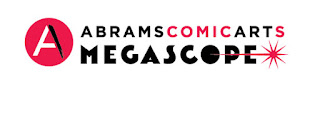The celebrated imprint Abrams ComicArts is launching its first publishing list from Megascope, the new line of graphic novels curated by John Jennings. Jennings is an award-winning and New York Times bestselling comics creator and illustrator of graphic novel adaptations of Octavia E. Butler’s Kindred and Parable of the Sower. Megascope was first announced in 2018, and the inaugural publishing list will have two titles: After the Rain (October 27, 2020; Hardcover) by Nnedi Okorafor, adapted by John Jennings and illustrated by David Brame, and The Heavy (January 19, 2021; Hardcover) by Shawn Martinbrough.While there have been comic publishers that promoted an agenda of diversity, they largely seem to have faltered because they lacked the funding needed to really get books out there in a sustainable way. Looking back at Milestone as a counter-example, they pulled together enough money to publish some excellent, diversity-driven books but they weren't able to keep the books running long enough to gain a sustainable following. Only a couple of years. While Milestone's followers were solid fans, the company didn't have enough money to really push beyond their initial base. (To be fair, there were some notable industry issues at the time as well.) But Abrams has deep pockets and, if they're committed to this, can make sure these books get solid backing.
“When W.E.B. DuBois created the idea of the megascope in the short story The Princess Steel (1909), I wonder if he would ever have dreamed that he was giving us a gift of not just one future but myriad futures. The megascope functions as a lens through which so many unheard voices can be heard. I am so honored and excited to present this first slate of books that we have lovingly curated. It’s a very robust, diverse, extraordinary collection of narratives that, I hope, will foster conversation, celebration, and connection,” says Jennings. “The book is an empathy machine and ABRAMS has dedicated so much of its existence to making cutting-edge, well-designed, beautiful books for everyone. I am humbled by the talent and dedication that Abrams ComicArts has poured into this line of books. My hope is that our audience will see themselves and their commonalities with others in these graphic messages from the minds and hands of some of the most amazing creators working in graphic fiction today.”
The other thing I think is note-worthy in the announcement of some of their initial titles: they seem to be treating it as an imprint. (Despite seemingly making a point to avoid calling it that.) Without any special insider knowledge, I suppose the reason why they're not calling it an imprint has more to do with the inner workings of the accounting department at Abrams more than anything else. Regardless, the titles they're launching with point to ones that will be able to stand more-or-less in isolation -- they're not trying to be "the Black comics publisher." If you notice, the solicitation copy for The Heavy doesn't even suggest that it's for people of color or specifically talking to the Black experience. Even passing references to the main character's race are oblique at best. The stories are told by creators of color -- they're given the broad platform they're often denied -- and their stories are obviously going to be informed by their living in a not-always-tolerant-of-melanin society. But the focus of the stories isn't necessarily about that.
Jennings stated in the first press release, "Storytelling is an empathy technology and it gives us a space to share and explore everyone’s humanity... ABRAMS has repeatedly shown its dedication to creating beautiful books for everyone." (My emphasis in both cases.) I don't know that I've seen a comic
You know what this reminds me of, as I think on it? The Black Panther movie. That was a film that was up/down/left/right/sideways Black. It was a Black-written, Black-directed, Black-acted, Black-designed movie about Africans set in Africa. But, it was sold to the viewing public at large as just another chapter in the Marvel Cinematic Universe. And most melanin-challenged people watched it in exactly that way. Which was fine. They saw some superheroics and cool CGI and witty catch phrases and all the trappings of another blockbuster Marvel movie. But the Black audience saw loads, loads more. I saw the movie on three separate occasions during its opening weekend and the audience reactions differed considerably from theater to theater, depending on what percentage of the audience was Black. A lot of references just sailed right over the heads of most white folks. That was okay, though, because there was still a solid story and characters for them to get into.
I actually know Jennings and several of the people on the advisory committee; I'm pretty confident they'll approach Megascope books with the same kind of thinking. There will be a lot of really solid stories with well-rounded characters... and there'll also be a subtext that Black people will additionally be able to pick up on, but will be largely invisible to white readers. Of course, the creators will still have to deliver in order for Megascope to be successful, but Jennings knows talent when he sees it, so I've got zero concerns there. As long as Abrams keeps up their support for Megascope, I think there are going to be some really excellent books that will come out of there!







0 comments:
Post a Comment